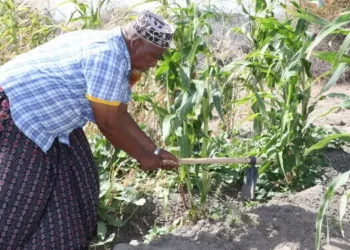(ERGO) – Nasteho Awil Abdullahi, a displaced mother of six, thought that moving into her own house in a camp outside central Somalia’s city of Galkayo would be the start of a new life.
She moved into her two-bedroom house in Wadajir IDP camp last September along with the other 200 families given permanent housing by Mudug authorities under a UNHCR-supported durable solutions project.
However, she and other residents have been dogged by food and water shortages in Wadajir, seven kilometres from the city, as the promises of essential services to be provided by the local authorities have not been met.
“There is no transport to the city,” Nasteho complained. “Bajaj (three-wheelers) come by once in a while, but they charge $3 to town and that is beyond our means, so we walk carrying what we need on our backs.”
“I feed the children when I come home at night, and if there are any leftovers I feed it to them as breakfast the next day.”
Those who can afford buy water from a nearby well at 2,000 Somali shillings for 20 litres. As Nesteho cannot always afford it, she often relies on the generosity of neighbours who share their water.
Nasteho was first displaced from Ethiopia’s Somali region by the 2017 drought. She settled in Galkayo’s Talo-ad IDP camp and was later evicted.
But she says she has never experienced such problems in accessing food and water before, even though she is now a home-owner.
Farhiyo Arab Ahmed, a 50-year-old mother of 12, was displaced from Ba’adwayn area in Mudug. She was also hoping her troubles were over after being a house in Wadajir camp.
“The aid agencies and the local administration promised us that we would be getting all the essential services. But what good is a house if you don’t have food and water?” Farhiyo asked.
Sakariye Si’id, head of the local administration’s social affairs department, which is responsible for IDP welfare in Galkayo district, told Radio Ergo that the families in Wadajir are particularly vulnerable due to the camp’s distance from the town.
He explained that they had been unable to meet their promises to the camp
residents because the Coronavirus pandemic had led to budget cuts in planned humanitarian projects, including water, health, education, and livelihoods.
“Only a fraction of the expected funding was received and that is not enough to satisfy the needs in the 16 camps in the district,” said Sakariye Si’id.
He said the housing provision was a good start, but the Wadajir residents desperately needed employment opportunities as most were dispossessed former pastoralists.
He added that his office was constantly receiving complaints from the IDPs and they were working hard to find solutions.
About 5,000 IDP families are living in and around Galkayo and their situation has worsened since the start of the pandemic, which slowed or stalled humanitarian services.










